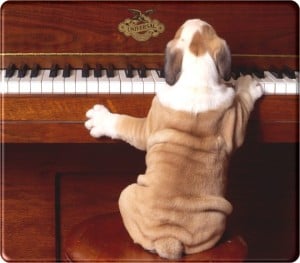Often there are little bumps along the road to potty or housetraining your dog or puppy.
Sometimes they may actually delay the training process and may make life much more challenging for the owner.
Some common potty training problems and questions that owners experience with their dogs or puppies are discussed below.
MESSING IN THE CRATE
Often dogs or puppies get into the habit of messing in the crate because they have been left in the crate for too long.
Start with a fresh liner, and work with the puppy or dog to get them outside sooner.
In addition, if the crate is much larger than the dog, he or she may see part of the crate as their den and part of the crate as the bathroom.
Inserting a board or wire mesh into the back of the crate and making it smaller can correct this.
A smaller crate only provides enough room for the dog to be in, not enough room for them to relieve themselves in part.
MESSING IN THE HOUSE WHEN YOU ARE AWAY
This is usually caused by either boredom or anxiety. Try walking the dog for a good, long, brisk walk before leaving them alone. If they have been crate trained you may wish to use this again, provided you will not be gone prolonged periods of time.
Leave lots of toys for the dog to play with, or try leaving an old, unwashed t-shirt in their sleeping areas so they know you are around.
TIME IN THE CRATE
Time in the crate is roughly equivalent to a dog’s age. A good guideline is one hour per month, up to a maximum of four hours.
Therefore a puppy of 2 months can stay in the crate a maximum of two hours after going outside before they will need to go again, provided they are not fed in between.
No dog should be created for more than four hours without the ability to signal to you they need to go outside.
FEED AND WATER SCHEDULES
By controlling the amount of food and water your dog or puppy has, you can regulate their times outside. Generally dogs will need to go outside between 15 and 30 minutes after eating.
They will need to urinate every three to four hours during the day, and mature dogs usually do not need to go out over the night once they are housebroken.
Therefore it is important to feed at least 45 minutes prior to leaving the dog or puppy alone. Be sure to follow crate-training procedures, or supervise them between eating and going outside.
It is better to take them out too soon that too late, so be sure to be carefully timing and watching for changes in behaviour.
Water should be free access during the day. Most dogs won’t drink at night once they are mature, but it may be necessary to remove the water from a puppy’s crate or bed area when you go to bed.
Be sure to give them fresh water immediately in the morning, and allow free access when you are there to monitor. Remember that dogs and puppies, like humans, will need to relieve themselves when they first get up in the morning or when they wake up from a nap.
RETURNING TO THE SAME SPOT TO URINATE IN THE HOUSE
This usually occurs because the dog can still smell urine, even if you cannot. Try using a deodorant with orange peel or even better ask your vet to recommend a product with active enzymes that will eliminate and not just mask the odour.
If at all possible restrict the dog or puppies access to the area and continue on with the housetraining program.
Warmly,
Sharda Baker

